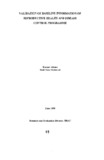Validation of baseline information of reproductive health & disease control programme
Citation
Afsana, K., & Mahmud, S. N. (1998, June). Validation of baseline information of reproductive health & disease control programme. Research Reports (1998): Health Studies, Vol - XXIV, 65–88.Abstract
The Reproductive Health and Disease Control (RHDC) programme has been in operation
since 1996. This study was conducted in RHDC programme areas to validate the
accuracy of baseline information as collected by the programme. Selected process
indicators, such as use of antenatal care, assistance during delivery by the trained
personnel, contraceptive prevalence rate and continuation and discontinuation rate of
methods were chosen to compare data between the programme and survey. For use of
antenatal care and trained personnel during delivery, a sample of210 women who gave
birth during January-December 1996 was drawn from among the members of village
organisations (VOs). For contraception, 450 currently married women were randomly
selected from the same VOs. The validated data of the programme were found in close
agreement with the survey data. For use of antenatal care, 99% of the programme data
were found to be accurate. Of the women who received assistance during delivery, 91 °u
were confirmed by survey. Accuracy was validated in 95% of cases for contraceptive
prevalence. Continuation rate of methods during 1996 as validated by the survey was
83% and discontinuation rate 23%. Predictive value of use of antenatal care, use of
trained personnel and contraceptive prevalence is very high but in contrast that of
discontinuty of methods is very poor. It has been suggested that due to very high
accuracy rate of programme data, it can be used as a reliable source of information.
However, validation of programme data can be done from time to time to check its
accuracy. Moreover, record-keeping system should be well-maintained and SSs'
activities well-supervised.

